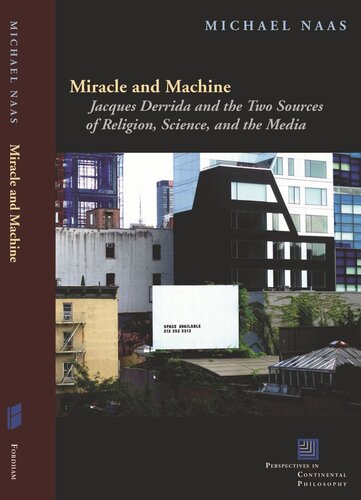

Most ebook files are in PDF format, so you can easily read them using various software such as Foxit Reader or directly on the Google Chrome browser.
Some ebook files are released by publishers in other formats such as .awz, .mobi, .epub, .fb2, etc. You may need to install specific software to read these formats on mobile/PC, such as Calibre.
Please read the tutorial at this link: https://ebookbell.com/faq
We offer FREE conversion to the popular formats you request; however, this may take some time. Therefore, right after payment, please email us, and we will try to provide the service as quickly as possible.
For some exceptional file formats or broken links (if any), please refrain from opening any disputes. Instead, email us first, and we will try to assist within a maximum of 6 hours.
EbookBell Team

5.0
78 reviewsMiracle and Machine is a sort of “reader’s guide” to Jacques Derrida’s 1994–95 essay “faith and knowledge,” his most important work on the nature of religion in general and on the unprecedented forms it is taking today through science and the media. It provides essential background for understanding Derrida’s essay, commentary on its unique style and its central figures (e.g., Kant, Hegel, Bergson, and Heidegger), and assessment of its principal philosophical claims about the fundamental duplicity of religion and the ineluctably autoimmune relationship among religion, science, and the media. Along the way it offers in-depth analysis of Derrida’s treatment of everything from the nature of religious revelation, faith, prayer, sacrifice, testimony, messianicity, fundamentalism, and secularism to the way religion is today being transformed by globalization, technoscience, and worldwide telecommunications networks. But Miracle and Machine is much more than a commentary on a single Derrida text. Through references to scores of other works by Derrida, both early and late, it also provides a unique introduction to Derrida’s work in general. It demonstrates that one of the very best ways to understand the terms, themes, claims, strategies, and motivations of Derridean deconstruction from the early 1960s through 2004 is to read critically and patiently, in its spirit and in its letter, an exemplary text such as “Faith and Knowledge.” Finally, Miracle and Machine attempts to put Derrida’s ideas about religion to the test by reading alongside “Faith and Knowledge” an already classic work of American fiction that is more or less contemporaneous with it, Don DeLillo’s 1997 Underworld, a novel that explores the same relationship between faith and knowledge, religion and science, religious revelation and the World Wide Web, messianicity, and weapons of mass destruction—in a word, in two words, miracles and machines.